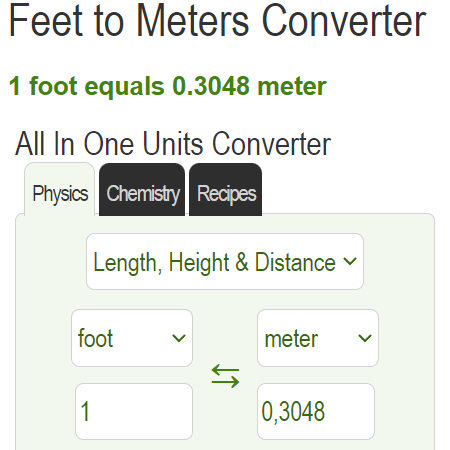1 meter to km
1 meter is equal to 0.001 km
Meter To km Converter
| ⇆ | ||
|
|
||
|
🔗 Help our site grow by sharing it!
|
||
To find the value in meter that corresponds to a value in km, multiply the value in meters by 0.001 (the conversion factor). Here is the Conversion formula
Value in km = value in meters × 0.001
Let's say that you have 1 meter and you want to convert it to km. By using the conversion formula provided above, you get:
Value in km = 1 × 0.001 = 0.001 km
This conversion formula works because one km is equal to 1000 meters.
To convert a different value in meters, simply replace the value in the formula above with the new value.
What is the Relationship Between Meters and Km
The Exact Relationship is Defined as follows:
1 km = 1000 meters
This means that to convert a measurement from meters to km, you multiply the value in meters by 1000.
Using The Calculator
Here is how to switch from meters to km:
- Determine the measurement in meters that you are working with: For this example, let's use
1 meter. - Apply the formula: Multiply the value in meters by 0.001:
Value in km = 1 × 0.001 - Perform the calculation: Youmay use want to use a calculator or do the math:
Value in km = 0.001 km
Conclusion
You've learned how to convert meters to km and vice versa! Use the formula km = meters × 0.001 for accurate results, or approximate using quick mental math for a rough estimate.
Common Questions This Converter Can Answer
Basic Conversions
- How many meters are in 1 km?
- 1 meter is equal to how many km?
- What is 1 meter in km?
Conversion Methods
- How do I convert from meters to km?
- What is the conversion factor between meters and km?
- What formula should I use to convert meters to km?
Practical Applications
- How do I measure meters in km?
- What's the equivalent of 1 meter when expressed in km?
- How can I convert between meters and km for my project?
Common Conversions
- What is 1 meter in km?
- How much is 10 meters in km?
- What's half a meter in km?
Professional Use
- How do I convert meters to km in technical documentation?
- What's the precise conversion rate from meters to km?
- How do international standards convert between meters and km?
Definition of Meter
A meter (m) is the fundamental unit of length in the International System of Units (SI). It is defined by taking the fixed numerical value of the speed of light in vacuum (c) to be 299,792,458 when expressed in the unit m/s. This modern definition, established in 1983, ensures that the meter is standardized through universal physical constants. The meter is used worldwide in science, industry, and everyday measurements. In practical terms, a meter is slightly longer than a yard, being approximately 39.37 inches. This unit is essential in construction, engineering, athletics, and countless other applications. The meter's subdivisions (centimeters, millimeters) and multiples (kilometers) form the basis of the metric system used globally.
Definition of Kilometer
A kilometer (km) is a metric unit of length equal to 1,000 meters (or approximately 0.621371 miles). This unit is the standard for measuring:
- Road distances and highway markers in most countries
- Geographic distances on maps and in navigation
- Running and cycling routes in sports and fitness
- Weather systems and visibility ranges
- Municipal planning and urban development
Related Conversions
Popular Length Conversions
Common Meter Conversions
- Meters to Feet - Construction and architecture
- Meters to Inches - Manufacturing and engineering
- Meters to Yards - Sports and athletics
- Meters to Centimeters - Everyday measurements
- Meters to Kilometers - Distance measurements
- Meters to Millimeters - Precision engineering



